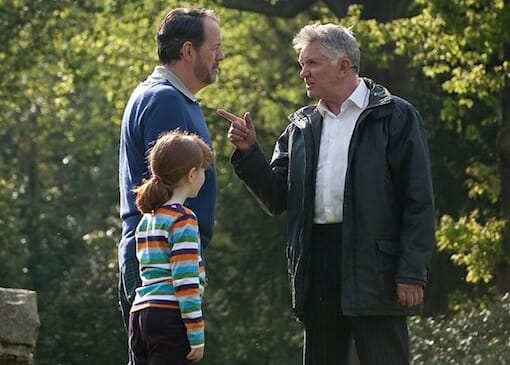Sign up for the
TSL Newsletter
and get $50 off Final Draft 12
By Andrew Watson · September 19, 2012

Three Things I Learned Watching Inspector George Gently
Inspector George Gently ended with a bang on Sunday night, complete with a cliff hanger ending and a bloody trail of action that rips up the usual Gently formula and plumps for the classic hero on the run story. This particular trope is a well-travelled one that has been used in pretty much every single genre under the sun. Our white knight hero and force for good (which in this case is our department’s “Mr. Clean”, Gently), has a spectacular fall from grace often orchestrated by nefarious means (the planting of false evidence accusing Gently (Martin Shaw) of murdering a police informant), and is forced to go on the run and clear his name. Although it follows this fairly standard form to the letter this was an entertaining episode of George Gently, which provides ideal Sunday night viewing. Here are a few observations about how it manages to keep a tired story fresh.
Subvert Elements of the Story…
One of the best and easiest ways to invigorate a plot is to carefully follow the rules of the story, and then do a complete swerve and go against type. With the sheer amount of TV and films we watch, we the audience can become jaded if we see the same old stories too many times. Characters become predictable, jokes can be overused, and trends can become clichéd (the impact of the Found Footage movie has diminished rapidly over the years). Playing with the expectations and the assumptions of the audience can surprise them and add to their enjoyment of the piece. George Gently’s big finale is a fairly standard shootout, complete with the moment of near death for the hero. With Gently on the ropes and about to die at the hands of the villain, everything looks bleak. Then suddenly his partner Bacchus (Lee Ingleby) arrives to save the day, like hundreds of supporting characters before him…except the trope is subverted into a brilliant tense sequence that leads to the powerful cliff hanger ending. To spoil the ending would be criminal, but it was a fitting end to the story.
…or Kill Them Off Entirely
If you could make a criticism of George Gently, it’s that the story doesn’t quite subvert the plot enough. One particular bugbear of mine was Don McGhee (Kevin Whately), a character I have seen in many different shows with the exact same outcome. After arriving early on in the episode sneaking into Gently’s house, he turns out to be an ex-police officer who has arrived to give some support to his old friend. He is a nice guy, very chummy, seems to have the main character’s interests at heart and they go way back. And yet, he does the exact same thing that all these characters do, as the twist reveals he is not as he seems and actually presents a direct threat to the hero. Although George Gently keeps Don largely off the screen, making his betrayal less easy to spot, the time of the actual revelation doesn’t have the urgency that it should. Perhaps if the idea of Don McGhee being the bad guy had seemed impossible, or if he had been replaced by an entirely different character, the plot might have worked much better.
Don’t Make Time and Setting an Afterthought
Finally, it is not only the plot that can become tired. If you are writing any kind of film or TV show, ask yourself “Where is this set?” If the answer to that question is “anywhere” then you are writing yourself into a big pit you might not be able to climb out of. People can become lazy and not think about the location of their script, without realising how it impacts the look and feel of your vision. Would Breaking Bad have the same energy if it wasn’t set in Albuquerque, New Mexico? The Coen Brothers avoided letting their distinct style become old hat by making Fargo, complete with Minnesota accents. Rather than placing your movie in Los Angeles or New York or London, you can freshen up an old idea by taking it into a new setting. This will offer new images to give the viewer but it will also give the writer opportunities to present old plots and characters in new ways. George Gently takes place in 1960s Northumberland, seldom seen in British TV drama and containing a large amount of iconic locations and a very unique dialect which affects the dialogue of the characters. The plot itself uses local history by using an illegal slot machine racket at the heart of its story, and the final shootout takes place in a village cathedral. Setting might not seem like it does much, but it can give your story a unique taste that can even overcome generic plots.